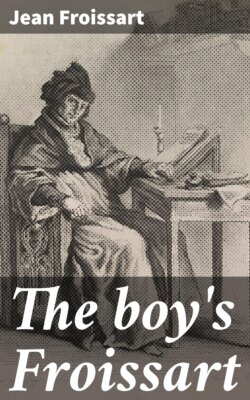Читать книгу The boy's Froissart - Froissart Jean - Страница 12
На сайте Литреса книга снята с продажи.
CHAPTER VIII.
ОглавлениеTable of Contents
The King of England and Sir Hugh Spencer are taken at Sea as they are endeavoring to escape from the Castle of Bristol.
The king and Sir Hugh Spencer, seeing themselves so closely pressed, and being ignorant whether any succor was coming to them, embarked one morning with a few followers in a small boat behind the castle, intending, if possible, to reach the principality of Wales. They were eleven or twelve days in this small boat; and, notwithstanding every effort to get forward, the winds proved so contrary by the will of God, that once or twice a day they were driven back within a quarter of a league of the castle whence they set out. At length Sir Henry Beaumont, espying the vessel, embarked with some of his companions in a barge, and rowed so vigorously after it, that the king’s boatmen, unable to escape, were overtaken. The king and Sir Hugh Spencer were brought back to Bristol, and delivered to the queen and her son as prisoners. Thus ended this bold and gallant enterprise of Sir John de Hainault and his companions, who, when they embarked at Dordrecht, amounted to no more than three hundred men at arms. By their means Queen Isabella recovered her kingdom, and destroyed her enemies; at which the whole nation, except some few who were attached to the Spencers, was greatly rejoiced.
When the king and Sir Hugh Spencer were brought to Bristol by Sir Henry Beaumont, the king was sent to Berkeley Castle under a strong guard. Many attentions were paid to him, and proper people were placed near his person to take every care of him, but on no account to suffer him to pass the bounds of the castle. Sir Hugh Spencer was delivered up to Sir Thomas Wager, marshal of the army.
The queen and all the army set out for London, which is the principal city in England. Sir Thomas Wager caused Sir Hugh Spencer to be fastened on the poorest and smallest horse he could find, clothed with a tabard such as he was accustomed to wear. He led him thus in derision, in the suite of the queen, through all the towns they passed, where he was announced by trumpets and cymbals by way of greater mockery, till they reached Hereford, where she and her suite were respectfully and joyfully received. The feast of All Saints was there celebrated with the greatest solemnity and magnificence, out of affection to her son, and respect to the noble foreigners that attended him.
When the feast was over, Sir Hugh was brought before the queen and knights assembled. The charges were read to him; to which he made no reply. The barons and knights then passed sentence on him,—that he should be drawn on a hurdle, attended by trumpets and clarions, through all the streets in the city of Hereford, and then conducted to the market-place, where all the people were assembled: at that place he was to be bound upon a high scaffold, in order that he might be more easily seen by the people.
Afterwards his heart was thrown into the fire, because it had been false and traitorous; since he, by his treasonable counsels, so advised the king as to bring shame and mischief on the land, and had caused some of the greatest lords to be beheaded by whom the kingdom ought to have been supported and defended. His head was cut off, and sent to London.
After the execution, the queen and all the lords, with a great number of common people, set out for London. As they approached it great crowds came out to meet them, and received both her and her son, as well as those who accompanied her, with great reverence.
The citizens presented handsome gifts to the queen, as well as to those of her suite where they thought them best bestowed. After fifteen days passed in feasts and rejoicings, the companions of Sir John de Hainault were impatient to return home. When the queen and her companions saw this, they addressed themselves to Sir John de Hainault, and requested him to remain only until after Christmas, and that he would detain as many of his followers as possible. He detained as many of his companions as he could; but small was the number, the greater part refusing to stay on any account.
The queen ordered a large sum of money to be given them for their expenses, besides jewels of high price, which she presented to each according to his rank; so that all were perfectly satisfied. She also paid to each, in ready money, the value of their horses that they chose to leave behind, according to their own estimation, without any demur.
